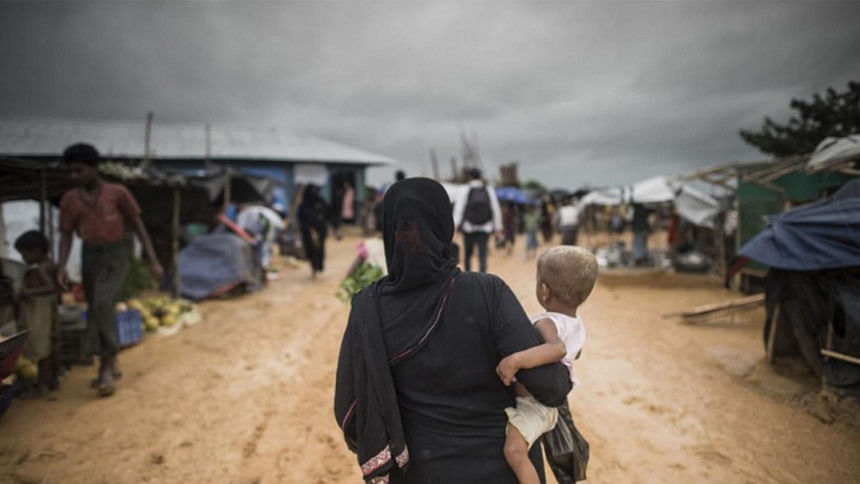One step forward, two steps back!

It is a supreme irony that victimhood and villainy sometimes get weighed on the same scale with material stake getting the better of the moral imperative. Manifestly therefore, the concerns over the Rohingya crisis that most of the world shares with Bangladesh—with the exception of Myanmar—in which they are rooted, have remained at the focal point of global attention, but not of action as such.
The establishment in Naypyidaw may have been rattled by mounting international pressure to end the collusive violence between the military and the Buddhist vigilantes that has all but emptied Rakhine State of minority Muslims, but the ruling junta is working overtime towards three agendas: One, looking to dictate the size and frequency of repatriation instalments; two, curtail the number of returnees so as not to outnumber the Buddhists in Rakhine State; and three, encage them in hamlets to flush them out at intervals as they have done over the years.
In such a context, their return with dignity, honour, livelihood and security can only be guaranteed by relocating them to IOM/UN-supervised safe zones leading to the restoration of their full citizenship rights.
It is in the interest of all concerned—the sending country, the host country, and inter- and intra-regional countries—that a sustainable solution is found to prevent textbook ethnic cleansing episodes against the weak and vulnerable from erupting time and again.
Lately, we have had unanimous condemnatory statements from the United Nations Security Council and the 63rd General Assembly of the Commonwealth Parliamentary Association held in Dhaka. Both the statements fell short of "resolutions" obviously for varying reasons, not to mention the difference in the calibration and clout of the respective platforms.
Incidentally, Myanmar, which was called Burma when it was offered the membership of the Commonwealth in 1948, refused to join it in a huff, true to its predilection to comfort in corralled cocoon, so to speak.
So forgetful of the Arakanese ancestry the country's historians have been, that it reads bizarrely amnesic! This is illustrated by the lyricist, singer, poet and translator (of Padmavati) Alaol, a son of Faridpur who had come under the wings of Magan Thakur, the chief minister of Rosang, the old name of Arakan province. The minister became the music disciple of Alaol who had mastered many languages—around the middle of the seventeenth century—to wield considerable influence in the now-troubled Rakhine State.
A likely veto from China stood in the way of passing a directional resolution by the UN Security Council. On the other hand, the CPA, a platform of 52 countries, could not adopt a resolution because of legal and time constraints.
Myanmar's State Counsellor Aung San Suu Kyi has reacted strongly to the UNSC's unanimous statement—softer than a resolution she should be happy about—urging the Myanmar government "to end the excessive military force and inter-communal violence" that has devastated the Rohingya community in Rakhine State.
What betrays a sad lack of gumption on her part is the statement that the UNSC's remarks may obstruct the process of bilateral negotiations that, according to her, were about to get underway.
The UNSC statement, at any rate, has been forward-looking in some aspects. For instance, it has categorically emphasised on the UN refugee agency and other relevant international organisations like IOM to fully participate in a joint working group. This can ensure safe and voluntary return of all Rohingya refugees to Myanmar.
The UNSC is "determined" to continue to closely follow the situation in Myanmar. It has requested the Secretary General to brief the council on the developments in Rakhine 30 days after the adoption of the statement.
The first hurdle is Naypyidaw's insistence on a strict bilateral formation of the joint working group. But the sticking point for Bangladesh is involvement of an UN agency in the repatriation process.
The second point of discord is fundamental in nature: Myanmar's Union Minister for Office of the State Counsellor Kyaw Tint Swe, during his visit to Dhaka, referred to the April 28, 1992 agreement as the basis to take back the refugees who could establish their bona fide residency in Myanmar prior to their departure from Bangladesh. In contrast, Bangladesh Foreign Minister AH Mahmood Ali did not agree to Naypyidaw's proposal of adhering to the criterion of 1992.
The context in 2017 is different with huge numbers being involved. Many of the refugees had left their abodes and rushed to Bangladesh in fear of being killed without any papers whatsoever. Thus, verification will have to be based on a three- tier system: registration of Bangladesh authorities and cards issued by them; verification from Myanmar's side and the UNCHR's inputs from both the Myanmar and Bangladesh sides.
The Myanmar government's commitment, to ensure that the humanitarian assistance and development work undertaken by the Union Enterprise Mechanism, is provided for the benefit of all communities, may be taken with a pinch of salt. Remember, Aung San Suu Kyi's spearheading speech after a long silence: it made a point about multiple priorities on her hand implying, one may infer, that she has to distinguish between the major and the minor, an apologia for not keeping abreast of happenings in Rakhine, one would have thought.
Shah Husain Imam is an adjunct faculty at East West University, a commentator on current affairs and former associate editor at The Daily Star.
Email: [email protected]





Comments